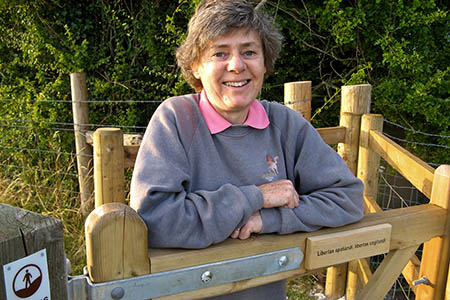A leading campaigner on access and rights of way has described press reports of impending challenges to rights of way as misleading and muddled.
The Times and Telegraph reported that homeowners will soon have the right to divert rights of way that pass close to their houses.
But Kate Ashbrook, general secretary of the Open Spaces Society, said a working party is still thrashing out details of how rights of way will be handled under the Deregulation Bill.
The Telegraph said: “Homeowners will be allowed to divert historic rights of way from their land under plans being drawn up by ministers.
“Owen Paterson, the Environment Secretary, wants to help householders who find that walkers regularly trample through their gardens or past their properties using centuries-old routes.
“The development follows years of campaigning by residential groups who say councils invoking ancient rights of way through private land have made their lives unbearable. A path becomes a right of way after 20 years of ‘unhindered public use’.
“Mr Paterson will give property owners the right to ask for a public path to be diverted so it goes round a house or garden rather than straight through it.
“Such requests would also be given a presumption in favour under statutory guidance being drawn up by his officials.”
Ms Ashbrook said: “The article in today’s Times is misleading and muddled. There is nothing in the draft Deregulation Bill about giving homeowners the right to bar ramblers from land.
“The bill, in streamlining the processing of claims for public paths based on historic evidence or 20 years’ uninterrupted use, enables a landowner, over whose land a path is claimed, to discuss with the local authority a simultaneous diversion to make the path claim uncontentious.
“Any such diversion must meet the current public-interest tests for diversions and [the Department for Environment, Food and Rural Affairs] has not, as stated in the article, said there will be a presumption in favour of such a request.
“The detail is still being discussed by the working group – consisting of representatives of landowners, path-users and local authorities – which is advising Defra on the Bill.
“The provisions are not a free-for-all for landowners as the article implies.”
The row came as the OSS celebrated the 80th anniversary of the law which enables the public to claim rights of way if there has been 20 years’ unhindered passage.
The Rights of Way Act 1932 came into effect on 1 January 1934 and applied throughout England and Wales.
Ms Ashbrook said: “To this rule we owe thousands of public paths.
The 1932 act also introduced a provision whereby a landowner could deposit with the local authority a map and statement indicating which routes he admitted as public highways.
Any routes not shown would need to be claimed by the public in order to gain the status of public highway. The map and statement had to be renewed every six years. This was recently updated in favour of landowners so that the map and statement only need to be renewed every 20 years rather than the six years originally stipulated.
The OSS general secretary said: “We are proud to celebrate the 80th anniversary of the act in which our society played such an important part.
“With good reason we were known as the ‘People’s Watchdog’.
“Landowners today claim that they suffer hardship when path users unearth evidence of a right of way over their land.
“But if they and their predecessors had followed the provisions of the 1932 act and subsequent legislation and deposited maps and statements of routes which they believed to be highways, there would be little opportunity now for surprises.
“They have only themselves to blame for failing to do this.”


